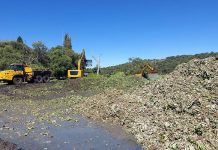The greatest problem with farming anywhere is depleted soil. As the soil is farmed, it brings in its wake a host of associated problems, namely pests and weeds. To counter these problems, pesticides, herbicides and artificial fertilisers were introduced, which, in the long run, made matters worse. In 1943 Edward H Faulkner, in his book Plowman’s Folly, exposed the bad practice of mouldboard ploughing, and promoted the principle of building up the humic content of the top 100mm of the soil through discing.
He also discovered the link between depleted soil and weeds and pests. He concluded that weeds play a very important role in nature – depleted soil attracts them like nectar attracts bees. Their deep, powerful taproots penetrate deep into the subsoil, break it down, and eventually they replenish the topsoil. It is no accident that you see the most weeds in the worst soils. They are doing their utmost to put right the damage man has done. Now we want to eradicate the very thing that is trying to help us.
The way he would rectify a depleted land was to allow the weeds to take over and run riot. Just before they were about to seed, he would disc them into the topsoil along with all the manure he could get. This produced a layer of rotting humus which very soon transformed the land. It was also able to hold far more moisture, and rendered it more resilient to drought.
Similarly, he found that the better the condition of the soil, ie high in decaying humus, the fewer pests there were. They too, have a job to do in nature, namely the eradication of the weak – the universal law of nature is at work. His contention was that if the soil is not alive with microbes and earthworms, it is depleted and useless.This seems fundamental, but why do so few farmers understand and implement this?
Do they even teach these fundamentals at farm school? Or maybe the vested interests only allow students to be taught which fertilisers and pesticides to apply. My suggestion is that anyone who is serious about improving yields get themself a copy of Faulkner’s book, and put those principles into practice.
Read the article on Adopt sustainable practices








